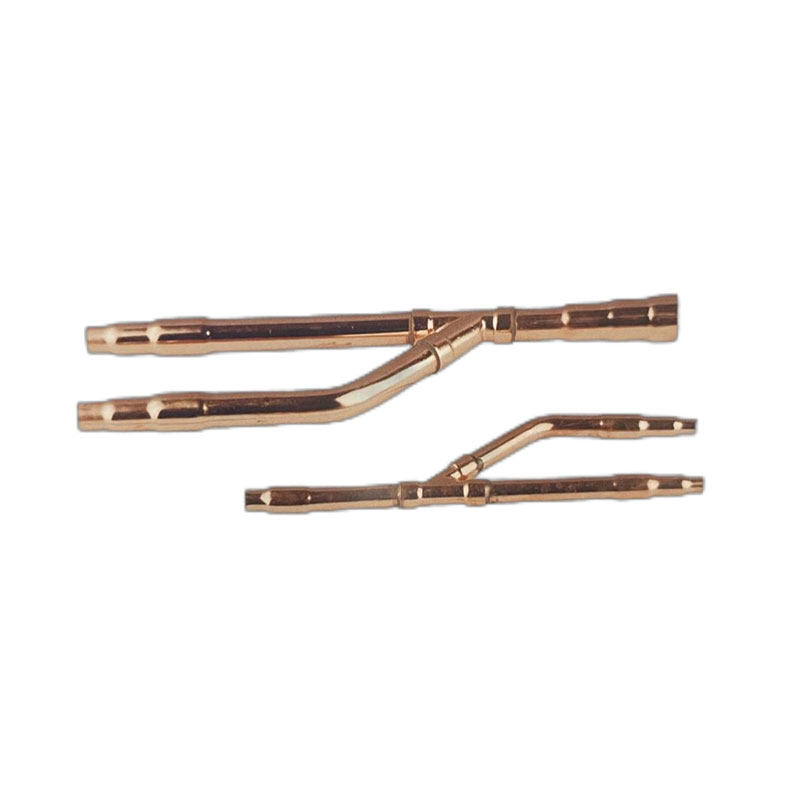What Makes Air Conditioner Branch Pipes the Key to Efficient Cooling Systems?
2025-11-13An Air Conditioner Branch Pipe plays a critical role in modern split-type and VRF (Variable Refrigerant Flow) air conditioning systems. It acts as the distribution channel that divides refrigerant flow between the indoor and outdoor units, ensuring efficient temperature regulation throughout multiple rooms or zones. This component allows a single outdoor condenser to serve several indoor units, making it indispensable for commercial buildings, hotels, offices, and large residential complexes where multi-zone cooling is required.
Air conditioner branch pipes are typically constructed using high-quality copper with precise brazing and insulation, ensuring superior thermal conductivity, corrosion resistance, and durability. The precision design of these pipes allows the refrigerant to flow smoothly and evenly without turbulence, which improves system efficiency and reduces energy loss.
The key function of the branch pipe lies in its Y-shaped structure, which splits the refrigerant flow while maintaining pressure balance. This ensures that each indoor unit receives the exact refrigerant quantity needed for optimal performance, whether in cooling or heating mode.
The article explores what makes branch pipes fundamental to HVAC systems, how they enhance performance and energy efficiency, and why their design and material selection matter for long-term use.
Product Parameters of Air Conditioner Branch Pipe:
| Parameter | Description |
|---|---|
| Material | High-purity copper (C1220T, C12200, or equivalent) |
| Size Range | Outer diameter from 6.35 mm to 41.3 mm |
| Type | Y-type and T-type branch pipes |
| Insulation | High-density rubber foam insulation for thermal protection |
| Application | VRF, multi-split, and ducted air conditioning systems |
| Working Pressure | Up to 4.2 MPa |
| Temperature Range | -40°C to +120°C |
| Connection Type | Brazing or flare joint |
| Certification | CE, RoHS, ISO9001 |
| Compatibility | Applicable with R22, R410A, R32, and R407C refrigerants |
Why Are Air Conditioner Branch Pipes Crucial for Energy Efficiency and System Reliability?
The efficiency of any air conditioning system relies heavily on how the refrigerant is distributed. Air Conditioner Branch Pipes serve as the precision tool for balancing the flow and pressure across multiple units. A well-engineered branch pipe minimizes refrigerant loss and prevents energy waste, directly impacting cooling capacity, system reliability, and operational costs.
1. Enhanced Energy Transfer Efficiency
Copper, known for its excellent thermal conductivity, ensures rapid refrigerant flow and optimal heat exchange. This minimizes resistance and prevents energy dissipation during transfer between the compressor and evaporator units. As a result, the overall system requires less power to maintain the desired temperature, improving energy efficiency by up to 15%.
2. Stable System Operation
Branch pipes help maintain consistent refrigerant pressure, preventing irregular cooling or overloading of specific indoor units. Their balanced design supports synchronized operation, allowing multiple zones to function independently without affecting one another.
3. Extended Equipment Lifespan
By stabilizing refrigerant flow, these pipes reduce compressor strain and protect the system from overheating or pressure fluctuations. This contributes to a longer lifespan of HVAC equipment, minimizing maintenance costs and downtime.
4. Noise and Vibration Reduction
High-quality branch pipes are designed with precise internal geometry to reduce refrigerant noise and vibration during flow. This feature enhances comfort in commercial and residential environments where silent operation is a priority.
5. Compatibility with Multiple Refrigerants
Modern air conditioner branch pipes are built to handle various refrigerants such as R410A, R32, and R407C, meeting the evolving standards of eco-friendly and high-efficiency cooling systems. This adaptability ensures their continued relevance even as HVAC technologies advance toward low-GWP (Global Warming Potential) refrigerants.
How Are Air Conditioner Branch Pipes Shaping the Future of Cooling Technology?
The future of HVAC systems emphasizes sustainability, modular design, and digital optimization. Air conditioner branch pipes, as integral components, are evolving alongside these trends to meet growing global demands for energy-efficient and eco-conscious solutions.
1. Smart and Modular HVAC Systems
As buildings become smarter, branch pipes must adapt to more dynamic and modular system configurations. In the latest VRF and multi-split systems, branch pipes are being designed with precision machining and enhanced brazing techniques to accommodate higher pressures from new refrigerants.
2. Green Refrigerant Integration
The industry’s transition toward environmentally friendly refrigerants (like R32 and R290) has prompted manufacturers to improve branch pipe design for better sealing and corrosion resistance. These innovations minimize refrigerant leakage and environmental impact, aligning with global energy efficiency regulations.
3. Enhanced Insulation Technology
Modern insulation materials used on branch pipes are more thermally efficient and moisture-resistant. They reduce energy losses by maintaining the refrigerant temperature throughout its journey, even in long piping layouts.
4. Precision Manufacturing and Quality Control
With the application of CNC machining and automated brazing, manufacturers can produce branch pipes with tighter tolerances and superior structural integrity. This precision ensures minimal resistance and turbulence during refrigerant flow, resulting in a more efficient and reliable cooling process.
5. Future Market Trends
The demand for energy-saving air conditioning solutions is projected to rise steadily, driven by urbanization and global temperature increases. The branch pipe market is expected to grow alongside the VRF system sector, particularly in regions like Asia-Pacific, Europe, and North America, where large-scale commercial HVAC installations are expanding rapidly.
In the future, Gangxin’s Air Conditioner Branch Pipes are expected to play a pivotal role in shaping advanced energy-saving systems by integrating innovative manufacturing techniques, eco-friendly materials, and strict quality standards.
Common FAQs About Air Conditioner Branch Pipes
Q1: What is the difference between a Y-type and T-type branch pipe?
A Y-type branch pipe splits refrigerant flow more evenly and is mainly used in VRF systems to ensure stable distribution to multiple indoor units. In contrast, a T-type branch pipe is often used for simpler split systems where refrigerant distribution is more direct. The choice depends on system design and refrigerant circuit configuration.
Q2: How should Air Conditioner Branch Pipes be installed for maximum efficiency?
For best performance, branch pipes should be installed following the manufacturer’s guidelines, ensuring correct brazing angle, flow direction, and insulation coverage. The branch should be placed close to the indoor unit branch point to minimize refrigerant travel distance and avoid unnecessary pressure loss. Improper installation can lead to uneven cooling and reduced system efficiency.
How Does Gangxin Redefine Quality in Air Conditioner Branch Pipes?
In the evolving world of HVAC systems, Air Conditioner Branch Pipes represent a vital connection between performance, efficiency, and sustainability. Their ability to evenly distribute refrigerant and maintain stable operation makes them indispensable in modern VRF and multi-split systems.
Gangxin, as a professional manufacturer, is dedicated to delivering high-performance copper branch pipes designed to meet international standards and the demands of future HVAC innovations. With continuous improvement in material quality, brazing precision, and insulation technology, Gangxin ensures that every branch pipe contributes to energy efficiency, long-lasting durability, and environmental protection.
For more details about product specifications, bulk supply, or technical consultation,
Contact Us today to learn how Gangxin Air Conditioner Branch Pipes can enhance your air conditioning systems and overall performance efficiency.




